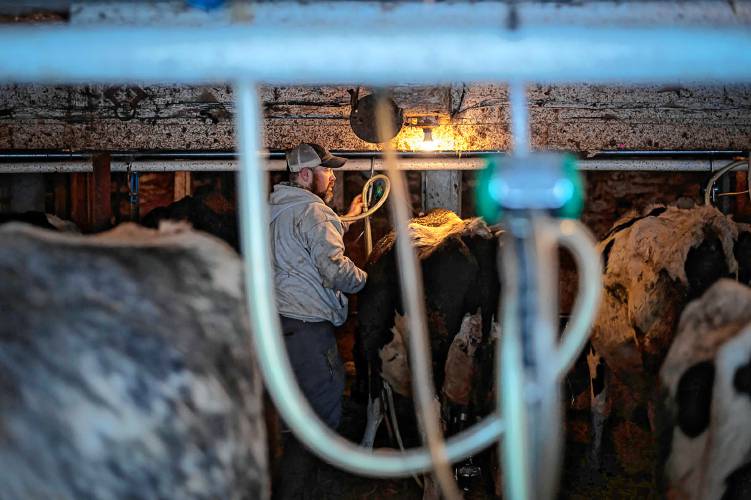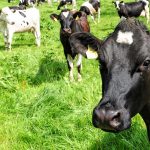
Boomhower grew up on the Fairfield, Vt., farm and bought it from his grandmother in 2012. He sells milk from 60 cows to Organic Valley, a company that made headlines recently when it picked up a large percentage of farms left behind after Horizon Organic left the region. Organic Valley’s move effectively saved those farms.
But organic dairy farmers across Vermont, including those who sell to Organic Valley, are still experiencing a crisis. While state and federal officials say help is on the way, farmers and industry leaders say it will likely come too late for many.
The number of organic dairy farms in Vermont is shrinking by the week, and Boomhower is one of many farmers to have publicly expressed distress at the current state of the industry.
“When you go out there and bust your tail all day and you’re not able to pay your bills, it becomes — honestly, I’ve kind of lost my love for farming during this time,” Boomhower said.
Some farmers have told officials with Northeast Organic Farming Association of Vermont, also called NOFA, that if they don’t receive help by spring, they’ll go out of business. The organization projects that, absent immediate relief, the state will lose 28 farms in the first half of 2023.
For years, the organic label earned certified dairy farmers a premium for their product, allowing farmers to engage in environmental practices that are gentler on the land and sometimes beneficial.
It’s also allowed them to stay small. An average organic dairy farm in Vermont is home to 80 milking cows. Across the state, 95% of organic dairies are considered small by the state, and 5% are considered medium, according to officials at NOFA.
The premium has meant that, unlike conventional farmers, organic farmers have not heavily relied on supplemental financial support.
But times have changed.
Maddie Kempner, NOFA’s policy director, told lawmakers that organic dairy farmers currently earn an average of $9 less for 100 pounds of milk than it costs to produce.
“It’s hard to overstress the significance of the crisis that organic dairy is in in our state,” Kempner said in an interview with VTDigger.
At the beginning of 2023, 140 organic dairies operated throughout the state (down from 203 in 2016). One farmer closed shop in January. A week later, by the time state lawmakers were presenting a $9 million emergency package for the industry to their colleagues on the House floor, three more farms had shuttered, leaving the state with 136 organic dairies.
Vermont lost 11 organic dairy farms in 2021 and 18 in 2022. Mike Thresher, a NOFA board member, estimates the three-year economic impact to the state is more than $215 million.
Critical timing
Across Vermont, buyers haven’t been able to pay organic dairy farmers enough for their product, and the price per 100 pounds of milk has hovered below soaring costs of production. Inflation, drought and disruptions in feed supply due to the Russian invasion of Ukraine have added to an organic market that already puts Vermont’s small farmers at a disadvantage.
In recent years, loopholes in the National Organic Program have allowed large farms in the West that have allegedly violated tenets of the organic program to become certified, lawmakers and industry experts widely agree, bringing a surplus of milk to the national market. The dynamic has created an uneven playing field for Vermont’s small farmers, who are held to tighter standards by the state’s organic program.
The U.S. Department of Agriculture recently closed a loophole that allowed farmers to raise young cows more cheaply using non-organic methods. It also strengthened the enforcement standard of a rule that requires cows to spend a certain amount of time grazing in pastures. Vermont organic farms largely celebrated the USDA’s move as a win, but farmers haven’t yet seen the ripple benefit that’s expected to come from the new rules.
“When we first transitioned to organic, it was pretty good,” said Ben Moulton, who owns an organic dairy farm in North Troy, Vt., and sells to Organic Valley. “We had really good years right up until probably like 2014-15. And then, I guess, the market started to slip somewhere.”
In December, in response to the emergency at hand, then-Sen. Patrick Leahy, D-Vt., included language in the federal omnibus spending bill that directed the USDA to find available funding sources to help organic dairies.
In turn, the U.S. Department of Agriculture recently rolled out a $100 million program to address the emergency. But the details haven’t been ironed out, and no one, including officials with the USDA, knows yet what the money will mean for farmers in Vermont.
Reactions to that funding have been mixed. Representatives from Organic Valley — a farmer-owned cooperative — say they’ve seen farmers experience extreme stress, and they’re looking for ways to improve conditions. The USDA program is one stream of funding that could help meet that need, said Adam Warthesen, director of government and industry affairs at Organic Valley.
“We’re looking at every avenue, whether it’s through the federal government, whether it’s in the marketplace, whether it’s in regional promotional campaigns — we’re looking at every avenue and this is one avenue,” he said.
Maddie Kempner, the NOFA policy director, is less optimistic about the impact of the program. It’s designed to address farmers’ marketing costs, which are minimal for farmers and not a large piece of the problem.
“If they were to just divide that funding evenly across the roughly 2,500 organic dairies that there are in the country, it would be an excellent amount of money,” Kempner said, but based on conversations with members of Vermont’s federal delegation, she doesn’t believe the math will work out that way.
Even if the money is significant, it likely won’t cover losses for the farms teetering on the edge, Kempner said, and it will likely come too late.
“The timing is just really critical right now,” she said.
An appropriate venue
Last month, lawmakers on the Vermont House Agriculture, Food Resiliency and Forestry Committee wiped away tears after hearing testimony from a slew of organic dairy farmers.
While the stories came from farmers who sold their milk to different distributors, represented different age groups and came from different parts of the state, all said their situations were dire.
The farmers, and members of NOFA, asked lawmakers to add $9.2 million to the state’s Budget Adjustment Act, H.145, which balances the state budget in the middle of the fiscal year. Lawmakers in the House have already approved the funding, and the bill now sits on the Senate side.
Young farmers testified that they hoped to buy into their families’ businesses but recognized that, if the farms go under soon, they’ll have no easy point of reentry into the industry.
Calvin Gould, a freshman at the University of Vermont studying dairy, told lawmakers that he hopes to eventually take over Lilac Ridge Farm, which his aunt and uncle own.
Organic dairy is “an industry full of people willing to support me and my dream, even if they look at me like I’m crazy,” Gould said.
Gould said an oft-repeated party line that “all farms are precious, and we need to support all farms,” has been “beaten into the ground.”
“We, best of anyone, know all farms are important,” he said. “But right now, organic farms are the ones in trouble. You don’t just leave 25% of an industry by the wayside. We need help in immediate action.”
Leanna Compagna, from Scholten Family Farm in Addison County, has been on track to buy the farm from her parents, but said if conditions don’t change, her parents may have no option but to sell.
Farmers “know how to become more efficient when you think there’s no other ways to become more efficient. We do all of that without compromising our animals and land. But we do compromise ourselves,” she said, her voice breaking.
Last year was an impossible year, she said — in part because of a severe drought in the Champlain Valley.
Peter Miller, an organic dairy farmer based in Vernon, Vt., who bottles some of his own milk and sells around 90% to Stonyfield Organic, has one of the most efficient organic dairies in the state, he told lawmakers. His cost of production remains on the low side while he obtains a higher price for his milk, in part because of his bottling operation.
He and his brother have talked about quitting after they “dumped a bunch of retirement money back in just to pay bills.”
“That really shook me at the foundation, and I realized that every other organic dairy in the state must be in really serious trouble,” he said.
Farmers are “an intelligent bunch, and part of the intelligence would be to walk away when it gets too tough, you would think,” Miller said.
If the funding passes, organic dairy farmers would receive a payment equivalent to $5 for every hundred pounds of milk they produced in 2022. The funding idea is intended to balance the farmers’ cost of production with the price that distributors paid them.
“This is more to them than their livelihoods,” said Rep. Heather Surprenant, P/D-Barnard, who is vice chair of the House Agriculture Committee and also an organic dairy farmer. “It’s a way of life and something they’re actively seeking to be in, and I would hope that folks would look at that and want to support them in that.”
While the House has already approved the funding, it’s possible it could hit roadblocks as it moves through the Senate and as it reaches the Gov. Phil Scott’s desk.
At a news conference on Tuesday, Scott said he had concerns about funding included in the Budget Adjustment Act. Kristin Clouser, Scott’s secretary of administration, clarified that the money for organic dairy was among his concerns.
“The administration is acutely aware of the economic challenges facing Vermont’s agricultural sector, and is not opposed to providing support for organic dairy farmers,” she said. “But the appropriate venue, again, for this conversation, would be in the context of the FY24 budget development, not budget adjustment.”
She pointed to the hurried manner by which the funding was included in the bill — farmers’ testimony came shortly before members of the House brought the bill to the floor — and said lawmakers did not take testimony from representatives of the Agency of Agriculture, Food and Markets.
Anson Tebbetts, secretary of the Agency of Agriculture, said determining the process for distributing the funds would be complex. Under the lawmakers’ current plan, the agency would develop a plan that would be reviewed again by lawmakers in mid-March. In that scenario, lawmakers would likely make a final decision in April, only a month before the fiscal year 2024 budget.
“We didn’t say no to these funds,” he said. “What we said is, we think a more appropriate place to have that discussion would be in the overall budget that has been working its way through the Legislature.” That budget likely would not be approved until May and would not take effect until July.
Boomhower said that, of the options available to Vermont’s organic dairy farmers, he’s most hopeful about the proposed $9.2 million.
“The scary thing is, when I look at at least the next year, I don’t see anything changing. You can’t keep on treading water the way we’re treading it. Like it’s just — it’s not possible,” Boomhower said. “Reality is, what needs to happen is organic milk needs to be $30 a hundredweight. That’s the cost of production.”























